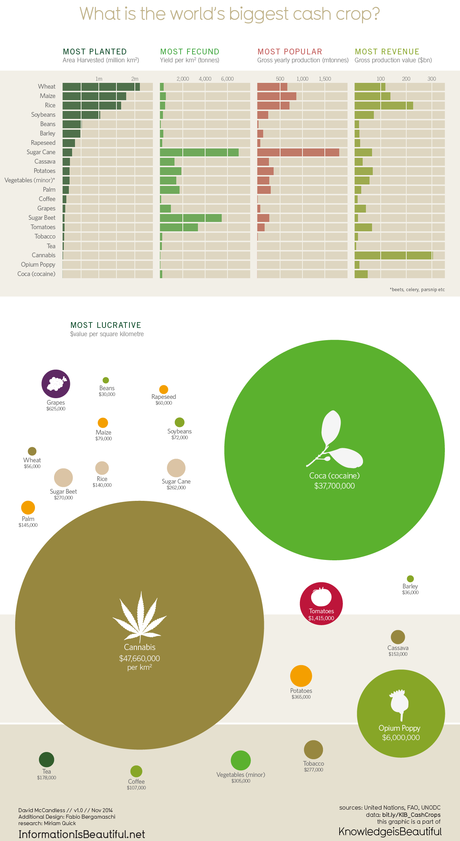The War on Drugs has been ongoing for over half of a century. That War laid the foundation for the modern police state and the continuing growth of American despotism.
The following graphic is not only testimony to the War-On-Drug’s failure, but also to its deceit. The top people responsible for waging that War don’t really want that War to be won. If they did, how could the following graphic be true?

In all the world, the three cash crops that produce the most revenue per square kilometer of cultivated soil are cannabis (marijuana),cocoa (cocaine) and opium poppy (opium). People who grow marijuana, for example, can expect to generate profits per square foot of cultivated soil that are 850 times greater than those of people who grow wheat.
Why are plants that produce drugs so lucrative? Because they’re illegal.
If government declared corn to be illegal it would soon be every bit as lucrative as opium.
It’s the government’s prohibition on these crops that make them so incredibly profitable. It’s the incredible profits associated with these drugs that guarantee their cultivation will continue to increase so long as that cultivation remains illegal.
I see five implications in this:
- Our primary addiction is not to to pot, coke or opium–it’s to currency. The plants that produce the most profits are the most addictive.
- If government really wanted to win the War On Drugs, it should legalize the cultivation of pot, coke and opium. Once legal, the profit-potential in those drugs would collapse and–while use of those drugs would never completely disappear–that use would be dramatically reduced. Most drug users are addicted more to the profits associated with the drug than they are to the drugs themselves. If “McGuff the Crime Dog” really wanted to take a “bite out of crime!” he should start by taking a bite out of the profits in illegal drugs. Given that the drugs’ profitability is primarily due to their illegality, the legalization of drugs should be the single most effective step in reducing the use of currently-illegal drugs.
- If it’s true that criminalizing the cultivation of some crops makes them incredibly profitable, does it follow that subsidizing the cultivation of other plants (corn & wheat, for example) makes them incredibly un-profitable? So long as government supposedly helps farmers by subsidizing their crops, does government guarantee that those crops will be only marginally profitable and the farmers are more susceptible to bankruptcy? Does the same principle apply to poor people on welfare? Could it be that the more financial assistance the unemployed receive from government, the less likely they are to ever again become employed, profitable and prosperous?
- If it’s true that criminalizing the use of some drugs makes them incredibly profitable, it should follow that regulating the use and availability of other drugs by means of FDA regulations and medical prescriptions, should also generate unreasonably high profits for doctors, hospitals and, especially, major pharmaceutical manufactures. Does criminalization necessarily lead to more regulation, bigger government and more profits for special interests?
- It might be argued that the criminalization of drug-producing plants (marijuana, cocaine, and opium) was a vital prerequisite for regulating all drugs and thereby guaranteeing fantastic profits for pharmaceutical manufacturers. I.e., once government criminalized the use and/or distribution for some drugs, it seemed “logical” and relatively easy for government to regulate the use of virtually all other drugs and “coincidentally” (?) guarantee fantastic profits for Big Pharma.
